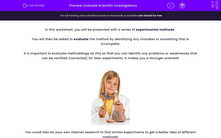Carrying out investigations is an essential part of being a scientist. From the experiments that you have already performed, you will know how important it is to spend time planning any investigation that you carry out. If insufficient thought goes into the planning process or creation of the instructions that are to be followed, serious errors can be made - sometimes with disastrous results.

For example, think back to your work on chromatography. Imagine that your teacher had been so over-excited by the prospect of an investigation that the instructions she gave out to the class were not detailed enough. Here they are:
Draw a line 2 cm from the bottom of the filter paper.
Place a dot of felt pen ink on the line.
Put the filter paper into a container holding water up to a depth of only 1 cm.
Watch to see the ink rise up the paper.
Once the ink has finished rising, measure the heights of each of the different colours that were contained in the ink.
At first glance, these instructions might seem adequate, but can you see some possible problems with them? Did you spot that it doesn't specify that the felt pens must be water soluble because permanent ink won't dissolve in water? Also, what if you drew the line at the bottom of the paper in felt pen - what would happen then? It needed to specify that the line should be in pencil. These might seem like unimportant details, but either of those errors could make the investigation useless and mean you had to start again.
Another error that can arise when performing an investigation is to fail to recognise what it is that you are actually trying to find out. Any amount of detailed instructions cannot make up for a lack of understanding of the purpose of the experiment. If you have been given instructions on how to measure the temperature of several containers of liquid, you need to know if this is because you are comparing them with each other. Failing to know that fact might affect the results, since you would not know to keep it a fair test or to be precise in the timing of the temperature reading.
In addition to this, many experiments carried out in science have potential hazards which need to be assessed and seriously considered. Failure to do this could be extremely dangerous.
In this activity, you will be presented with a series of experimental methods.
You will then be asked to evaluate the method by identifying any mistakes or something that is incomplete.
It is important to evaluate methodology so that you can identify any problems or weaknesses that can be rectified (corrected) for later experiments. It makes you a stronger scientist!

You could also do your own internet research to find similar experiments to get a better idea of different methods!
Now it's over to you.








